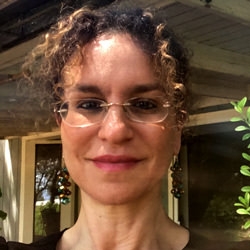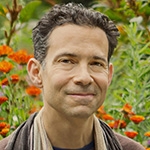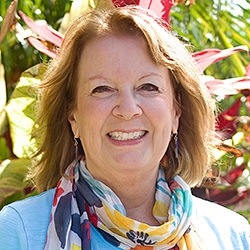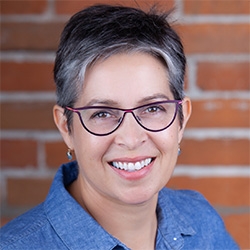

Search Results: impact
-
Whether privileged or not, its not easy to see the humanity of others in different social locations, especially if their actions have unwanted impacts and have left behind our humanity. Aiming for “both sides hearing each other” empathically, and to focus on effect rather than intent when we have more privilege, may theoretically lead to liberation. Yet, in practice it can reinforce rather than transcend power differences -- unless there's specific ways to focus attention and choice. Here, its important to transform expectations into working with willingness, and within our own terms and timetable.
-
- Celebrate and nurture your relationship to the Earth — and each other!
- Explore your connections to family, partner, work, nature, self and more
- Discover new ways to grow in community and work together to make this world a better place
- Engage and immerse yourself in NVC while making new friends!
-
Aya Caspi, a Certified NVC Trainer discusses how the "story" we tell ourselves about human nature impacts our childhood and the roles we are taught to play in society.
-
When we don't like what someone is saying to us, sometimes people encourage us to hear their needs, and "not take it personally" -- and we're inclined to agree. Could "not taking it personally" close our hearts and awareness to others, life and ourselves? Rachelle Lamb invites us to take a closer look at what it's like when we attend to the situation from our hearts, and skillfully reflect upon our actions with tenderness.
-
Could our "need for autonomy" be getting in the way of "partnership consciousness" (as NVC is sometimes called). Could "autonomy" also block healthy relationships with not only ourselves and with others, but also with the planet? This article invites us to consider how "autonomy" may colour our NVC practice at the peril of our critical values. Values such as our care for impact, shared responsibility, interdependence, compassion, consideration, and more...
-
Getting "feel good" empathy can become an addiction. Even to the point of seeing people who don't offer empathy as "not being NVC". Rachelle urges us to notice how this view of NVC can be seductive, and even dangerous. In this article, she explains how we can expand our compassionate awareness when we go beyond equating NVC with harmony and empathy. She asks us to become more open to noticing others' experiences even if it challenges our personal and collective belief systems -- and especially when it upsets us to consider it.
-
"All humans share the same needs" -- tragically, this idea can hide the reality that some people with less power in society have needs that go unmet to a greater extent, much longer, and with more dire consequences. Often, when the marginalized bring up experiences related to their membership in a certain group, their pain isn't acknowledged, and focus shifts to the listener's discomfort. The concept of universal human needs can be used to silence and minimize their pain. Read on for how to proceed.
-
Amidst racial violence, there are things that NVC can offer. And there are places where NVC culture needs to be more vigilant. Here are examples of where, amidst incredible loss and pain, "allies" and communities commonly (and often unknowingly) create false equivalences, minimization and re-injure those who've been historically marginalized -- even when they offer empathy, or aim to stay "safe". Read on to cultivate greater understanding and ways to respond differently.
-
What do we actually mean by “use of force” and what counts as such? Here's a template that will be unpacked in this article: "Use of force is consistent with nonviolence to the extent that we use the least amount of force possible, with the most love possible, aiming at (re)creating conditions for dialogue; that we make the choice using as much nonreactive discernment as possible, with as much support for the choice as possible, and while mourning not seeing another way to respond to a situation in which vital needs are at stake except to use force". Read on for more.
-
Working for racial justice is a shift in perspective—a shift in understanding and empathy that leads to a change in our actions: to listen instead of talk, to follow instead of lead, to yield rather than dominate. And to accept that I will continue to mess up. Part of working to undo racism is having the humility to know when our own understanding is limited. Read on for more this, and how it relates to meditation -- plus personal and collective liberation.
-
Many believe it's only a true NVC request when we can ask for what we need without urgency or insistence. But what if we're the target of oppression and hate in a world with systemic inequality? Is it still nonviolence to abdicate power by allowing the person enacting harm to be the one to decide whether harm continues? The intensity of the need, degree of harm, and how chronically unmet the need is, are factors to guide us for when to apply force and demand within NVC. We can be attached to outcome, without being attached to strategy.
-
Trainer Tip: While everyone's feelings are a result of their own met or unmet needs it's still important that we take responsibility for our actions. This means acknowledging when our behaviors are a stimulus for another's pain, and expressing regret -- to support our own needs for care and consideration. In the process, taking responsibility where it's due in this way can enhance and deepen our relationships.
-
Aya Caspi delves into the impact of societal structures and parenting approaches on individuals, particularly the prevalence of extrinsic motivation rooted in fear of punishment, desire for rewards, and a sense of obligation. The emphasis is on how these dynamics contribute to collective trauma and affect brain development. Examples, such as Hitler's childhood and the adverse effects of the educational system, are used to illustrate the consequences of such practices. Aya advocates for systemic change in these structures and emphasizes the role of non-judgmental practices in potentially reducing adult depression. The discussion highlights the importance of empathy and challenges the traditional methods that may lead to emotional neglect and trauma, emphasizing the potential benefits of embracing non-judgmental approaches in parenting and societal frameworks.
-
When someone's in immense pain and uses words that are hard to hear, see if you can bring in as much attention and compassion as you would to someone who was cut with a sword. Focusing on what's important to them, and not so much on how it was said. This may support greater understanding and healing. Otherwise, we risk prioritizing needs, norms, and inequities of the dominant culture, over caring for people who bear the invisible brunt of such norms.
-
While so many of us know how close we are to the edge of global catastrophe and want change, what makes the existing global system continue to function with our ongoing participation? Read on for more on the challenges and path towards learning to steward life and all the resources of this one planet for the benefit of all.
-
How can we hold love, understanding and compassion -- and still confront people about the harmful impact of their actions, hold them accountable, take action, speak truth and advocate for change... all in a manner fully aligned with our values and vision? Read on for how we can do accountability; what kind of action we take and with what motivation; and what our movements for change can look like from this lens.
-
When someone expresses upset about our actions, and we focus on our intention being seen and understood (e.g. "I didn’t mean to hurt you”) it doesn't support the speaker in being heard more deeply with care. Here we'll explore this dynamic in a way that supports more clarity and the possibility of greater personal liberation. Read on for more.
-
When supporting someone with less privilege, first check with them how you can support. If you're reacting more strongly to their undesirable experience than they are, this then shifts the dynamic so that they're setting aside what they want to attend to your feelings and needs - this may become work that they didn't sign up for. Read on for what to do instead to support more equity.
-
For us to have a more peaceful world and relationships, growing our skills to engage interdependently is key. An interdependence-oriented person may choose to attend to both inner factors and outer factors that affect their own and others' experiences. Unfortunately, this is likely to be misunderstood by independence-oriented people as enmeshment -- and this is where conflict emerges. Read on for more.
-
How do you repair a relationship when your words or actions unintentionally impact another in a negative way? And what keeps you from apologizing? Join Lore to explore – and answer – these questions and more!

Quick Links
Subscription Preferences
Stay In Touch!
Looking for ways to keep up with NVC Academy news, get special offers, free resources, or words of inspiration? Here are five ways to stay engaged:

















